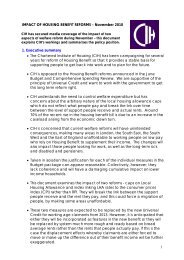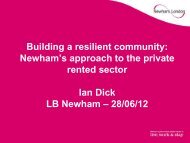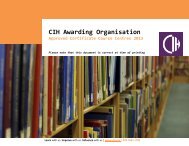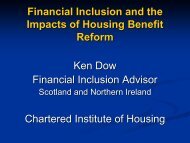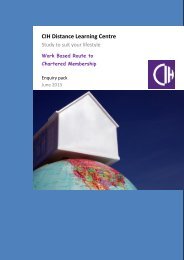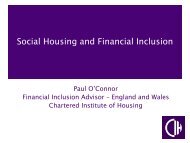View publication - Chartered Institute of Housing
View publication - Chartered Institute of Housing
View publication - Chartered Institute of Housing
Create successful ePaper yourself
Turn your PDF publications into a flip-book with our unique Google optimized e-Paper software.
THE ‘RIGHT STUFF’ FOR LEADERS IN SOCIAL HOUSING<br />
Are you an adaptive leader?<br />
Although no simple set <strong>of</strong> questions can portray how adaptive leadership is effectively<br />
undertaken in any organisation, the following set <strong>of</strong> questions (adapted from Heifetz,<br />
Grashow & Linsky, 2009) can be a good start for assessing adaptive leadership in an<br />
organisation:<br />
• How frequently does the ‘unspeakable’ get said and discussed? How quickly are<br />
crises surfaced and bad news discussed (rather than impose a knee-jerk reaction)?<br />
• How apparent are behaviours that are broadly seen as acting for the benefits <strong>of</strong> the<br />
organisation rather than protecting individual groups or silos?<br />
• When someone is seen to take a risk in service <strong>of</strong> the organisational mission, and it<br />
does not work out, to what extent is this seen as a learning opportunity rather than<br />
a failure?<br />
• To what extent are senior managers seen to identify and mentor their successors?<br />
• To what extent do individuals and teams in the organisation reflect and learn from<br />
experience?<br />
The ‘Right Stuff’ leads to the right results<br />
The Government <strong>of</strong> Singapore has instituted the PS21 programme. This initiative is<br />
designed to ‘encourage a mind-set that welcomes experimentation and a desire to<br />
continually find new and better ways <strong>of</strong> doing things. PS21 gives every public <strong>of</strong>ficer the<br />
mandate and platform to contribute their ideas for a successful Public Service’. 43<br />
Although broad in scope, the PS21 initiative is designed to encourage a people-centred<br />
mass movement to increase involvement and commitment to new, innovative solutions<br />
to persistent social problems. Such approaches call upon principles <strong>of</strong> co-creation and<br />
collaboration across organisational boundaries. In the UK, NESTA is working with local<br />
councils and other public sector institutions to nurture collaborative activities (Boyle &<br />
Harris, 2010). It is clear from an organisational perspective that such practices can<br />
potentially <strong>of</strong>fer many benefits. However, for such initiatives to be sustained requires<br />
leadership teams that recognise the advantages and are prepared to adopt different<br />
values and behaviours that foster openness, innovation and culture change.<br />
Social housing and the public sector in general, are struggling with the legacy <strong>of</strong> a<br />
culture that reinforced a reluctance to fundamentally alter how organisations saw<br />
themselves and their operating environments. In much the same way as the ‘heroic’ test<br />
pilots <strong>of</strong> the 1950s and 60s were seen as representing previous accomplishments,<br />
69




